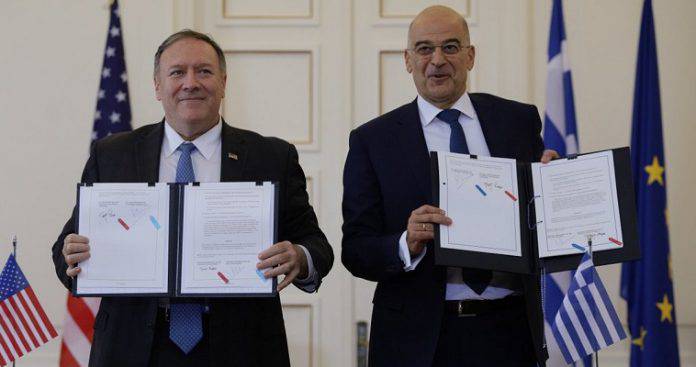Stavros Lygeros: What Pompeo’s visit left behind – When Greece “missed the train”
04/10/2020
The US Secretary of State visited Thessaloniki and Souda, was hosted by the Prime Minister, said what he had to say and left. The Greek media underscored in all tones the political symbolism of Pompeo’s visit, but if we scratch the surface a little we will not find much.
It would be wrong to nullify the importance of the visit, but the exaggerations that have flooded the public sphere are equally wrong. The Americans have every reason to be satisfied with Greece in recent years. The country gave them what they asked for and asked for virtually nothing in return. And if Greece made a request, it submitted it so sheepishly that they had no reason to respond.
In fact, they secured everything they had asked for, offering only words, and they said this carefully and sparingly so as not to further disrupt their relations with Ankara. It is true that they made positive statements about the piratical drilling of Ankara in the Cypriot EEZ and about the illegal surveys of the Oruc Reis survey vessel. But are they enough to be considered a sufficient return? Do Greeks have a real reason to be satisfied too?
The measured positive diplomatic attitudes of the Americans have no cost for them. The rift in their relations with Turkey forces them to invest politically and militarily in Greece. This may have a positive effect on Greek national security, but whatever they do they do it to serve their own interests. In other words, they did not give us anything in return.
The term not set by Greece
A good ally does not mean a given and obedient ally. The rules in international relations are reciprocity, convergence of interests, and exchanges. The political crime by omission of the Mitsotakis government (a continuation of the Tsipras-Kotzias policy) was perpetrated in the negotiations for the new Greek-US military agreement signed about a year ago.
In order to offer the requested military facilities, Athens should then have made conditional a written formal commitment that the US guarantees with all available means the national security of Greece. The Americans did not want – on their part – to make such a commitment. On the other hand, however, they very much wanted military facilities. The Greek side should have posed the dilemma: “without a guarantee, no bases are given”. If Mitsotakis had done so, at least they would have had to negotiate seriously.
Obviously, it would be difficult to give a strong guarantee, but not impossible. This is because due to the American-Turkish rift, the US needs Greece. Athens, however, made no serious effort to secure a trade-off. It gave all and received only nice words! I do not underestimate the positive diplomatic statements, but it has been shown that words do not deter Erdogan.
Back in the “western fold”
The United States will not use the threat of effective sanctions to contain it. In other words, they are not determined to go far, not even at the level of non-military measures. They did not do so for the crucial issue of the S-400s. It is obvious that Washington wants – at least for the time being – to avoid a rift with Turkey, still hoping to bring it back to the western “fold”. But if the US-Turkish gap turns into a rift, the US will have no choice but to make Greece a front-line country, for the first time since WW II.
For now, however, they are avoiding actions that they believe will push Erdogan further into Putin’s arms. In reality, however, Erdogan – for reasons that will not be dealt with here – is not at all willing to return to the “western fold”, nor fall into Putin’s arms.
As has been seen in Syria and Libya, and as is even clearer in the Nagorno-Karabakh conflict, the Russo-Turkish approach is mere expedieny, unstable and volatile. This is due to the conflicting strategic interests of Moscow and Ankara on almost all fronts. Playing the card of Islam, Erdogan seeks to elevate Turkey to an autonomous regional power, which on occasion will clash or confront some of the great powers.
Erdogan’s gamble
This strategy is risky. Not only because the great powers do not want autonomous regional players on the “field”, but also because there is a greater or lesser conflict of interests between Turkey and both the United States and Russia. In Syria and Libya, Moscow, sometimes with a stick and sometimes with a carrot, was trying to reach a compromise with Ankara in order to keep it away from the West.
In the Caucasus, however, things are more complex, given that we are talking about who will call the shots in Russia’s geopolitical backyard. This practically means that the margins of the Russian-Turkish compromise are shrinking a lot. The same goes for Iran, which justifiably considers a military defeat of Armenia a very negative development.
Erdogan may believe that his move will show the West in practice that he can be useful on the anti-Russian front, but things are more complex than he thinks. We see this from the reaction of France, which also confirms in the case of the Azeri-Armenian war, that it has crossed the Rubicon in terms of Turkey. But neither does the United States show much enthusiasm for supporting Turkish intervention in the Caucasus.
The statements by Pompeo and Mitsotakis
Developments in the wider region de facto upgrade the geopolitical importance of Greece. In other words, its negotiating position vis-a-vis the Americans is stronger than in the past. This fact allowed it to demand serious trade-offs and there was certainly no reason for Athens to grant valuable military facilities to the USA.
Gradually a major geostrategic opportunity emerges, but opportunities have value when you seize them. In order to be exploited properly, however, they need political will and elaborate (integrated in a global national strategy) moves by the political system that manages the fate of the country. At this level, however, it is constantly confirmed that there is a serious deficit.
Anyone who watched the statements of Pompeo and Mitsotakis in Crete, saw the American Secretary of State talking about “tough policy” and the Greek Prime Minister about international law! Rhetoric is good for international law, but when it comes to substituting the necessary national strategy (foreign and defense policy) it turns into a catastrophic trap.
Greece is client state
The US seeks to serve its own national interests and so it does. Athens must do the same, given that for the first time there is, at least, a partial convergence of Greek and American interests, hence the bilateral Strategic Dialogue. Athens, however, did not serve its national interests, by simply saying “yes” to what the Americans asked of it.
By obediently saying “yes” you are a dependent “follower” not an ally. In many ways the “bird has now flown”, but at least, even after the fact, let’s change course. Athens needs to work out a realistic overall plan on how convergence with the US can be nationally beneficial. To identify the issues in which the interests of both sides “click” and to implement specific mutually beneficial actions within these.
And if Washington insists until the end on its refusal to guarantee Greek national security, it would have to pay large sums of money at other levels (eg free provision of advanced weapons systems), corresponding to the military facilities offered. And if it would not be willing to give that either, then it should not be given facilities, or at least remain institutionally “up in the air”, in order to put pressure.
How can this be, however, when the domestic political system considers that the mere granting of military facilities to the Americans serves national interest? This is nothing more than an internalization of the dependency regime. The way the political system perceives the role of Greece does not help. The tradition of the client state was and remains strong. We also saw it reflected in the so-called defense agreement.





